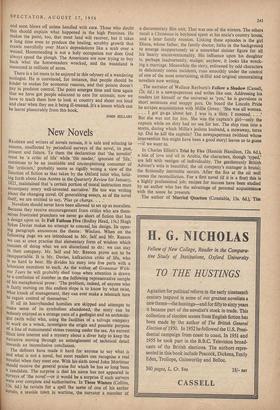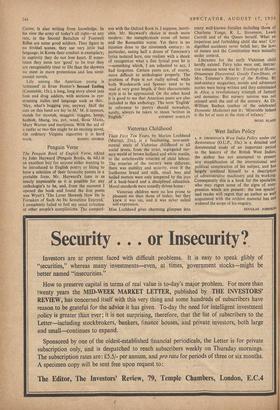New Novels
READERS and writers of novels remain, it is safe and solacing to assume, unaffected by periodical surveys of the novel, its past, present and future. To them the declaration that 'the, novelist' must be 'a critic of life' while 'the reader,' ignorant of 'life,' continues to be an insatiable and uncomplaining consumer of the 'criticism,' probably seems as rigidly wrong a view of the function of fiction as that taken by the Oxford tutor who, hold- ing forth about Jane Austen in the Quarterly Review for January, 1821, maintained that 'a certain portion of moral instruction must accompany every well-invented narrative.' He too was writing about the changing novel. Of generaliting essays, as of the novel itself, we are entitled to say, 'Plus cc, change. . .
Novelists should never have been allowed to set up as moralists. Because they receive encouragement from critics who are them- selves frustrated preachers we never go short of fiction that has a design upon us. In Full Fathom Five (Bodley Head, 15s.) Hugh Sykes Davies makes no attempt to conceal his design. Its open- ing paragraph announces the theme : Wisdom. When on the following page we are introduced to Mr. Self and Mr. Reason we can at once practise that elementary form of wisdom which consists of doing what we are disinclined to do: we can stay in their company. Mr. Self and Mr. Reason prove not to be insupportable. It is Mr. Davies, kafkacious critic of life, who is so hard to bear. He divides his story into five parts with a laborious exordium to each. As the author of Grammar With- out Tears he will probably shed none when attention is drawn to a confusion of number in the following representative sample of his metaphorical prose : 'The problem, indeed, of anyone who is fairly moving on this endless slope is to know by what twist, What knack of management, they can ever make a telemark turn to regain control of themselves.'
If all its heavyhanded homilies are skipped and attempts to make sense of its symbolism abandoned, the story can be sedately enjoyed as a strange yarn of a geologist and an archaeolo- gist (with wife) who, using the facilities of a salvage company at work on a wreck, investigate the origin and possible purpose of a line of monumental stones running under the sea. An earnest illicit love interest and a mystery about a diver help to keep the narrative moving through an entanglement of technical detail towards an inconclusive conclusion.
The definers have made it hard for anyone to say what is and what is not a novel, but most readers can recognise a real novelist when they meet one. With his sixth novel John Mortimer should receive the general praise for which he has so long been a candidate. The surprise is that his name has not appeared in surveys of 'the novel'—or it would be a surprise if such surveys Were ever complete and authoritative. In Three Winters (Collins, 13s. 6d.) he revisits for a spell the scene of one of his earlier novels, a seaside town in wartime, the narrator a member of a documentary film unit. That was one of the winters. The others recall a Christmas in boyhood spent at his uncle's country house; and a later family reunion. Linking these episodes is the girl Diana, whose father, the family doctor, lurks in the background to emerge inopportunely as a somewhat sinister figure for all his hearty unconventionality. His influence upon his daughter is, perhaps inadvertently, malign; anyhow, it looks like wreck- ing a marriage. Meanwhile the story, enlivened by odd characters in deliciously comic incidents, runs smoothly under the control of one of the most entertaining, skilful and original unmoralising novelists now writing.
The narrator of Wallace Reyburn's Follow a Shadow (Cassell, 12s. 6d.) is a newspaperman and writes like one. Addressing his readers (or himself or the universe) as 'you,' he is garrulous in short sentences and snappy pars. On board the Lincoln Pride he scrapes acquaintance with Millie Green : 'She was all woman. . . . I got ga-ga about her. I was in a tizzy. I mooned. . . But she was not for him. She was the captain's girl—only the captain while on duty had no use for her. The ship runs into a storm, during which Millie's jealous husband, a stowaway, turns up. Did he kill the captain? The newspaperman (without whose intervention this might have been a good story) leaves us to guess —if we want to.
In Charles Elliott's Trial by Fire (Hamish Hamilton, 12s. 6d.), a tale of love and oil in Arabia, the characters, though 'typed,' are left with vestiges of individuality. The gentlemanly British Adviser's wife is beautiful; the oil company's manager is brutal; the fictionally inevitable occurs. After the fire at the oil well comes the reconciliation. For a first novel (if it is a first) this is a highly professional job; recipes for success have been studied by an author who has the advantage of personal acquaintance with the scene he presents.
The author of Married Quarters (Constable, 13s. 6d.), Tim
Carew, is also writing from knowledge. In his view the army of today's all right—at any rate, in the Second Battalion of Fontwell Rifles are some good soldiers. They figure in no brothel scenes; they use very little bad language; in Korea their conduct is exemplary; in captivity they do not lose heart. If some- times they seem too 'good' to be true they are recognisably truer to life than the showers we meet in more pretentious and less senti- mental novels.
Life among the American young is 'criticised' in Evan Hunter's Second Ending (Constable, 15s.), a long, long story about jazz fans and drug addicts, with sections in eye- straining italics and language such as this: 'Hey, what's bugging you, anyway. Half the cats on this band are hip to M.' M, it appears, stands for mootah, muggles, miggles, hemp, hashish, bhang, tea, pot, weed, Rosa Maria, Mary Warner and marijuana. With the aid of a reefer or two this might be an exciting novel. On ordinary Virginia cigarettes it is hard



































 Previous page
Previous page